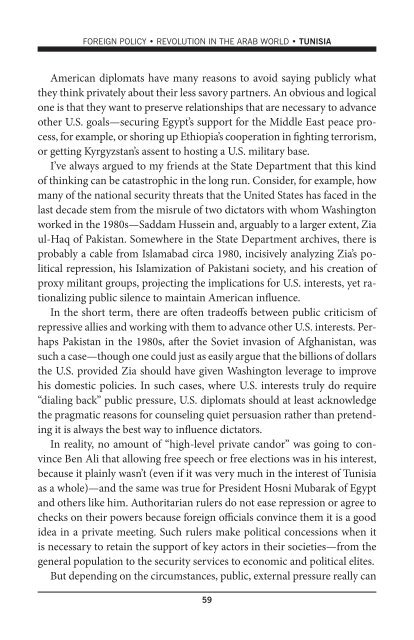Revolution in the Arab World - Observation of a lost soul Blog
Revolution in the Arab World - Observation of a lost soul Blog
Revolution in the Arab World - Observation of a lost soul Blog
You also want an ePaper? Increase the reach of your titles
YUMPU automatically turns print PDFs into web optimized ePapers that Google loves.
foreign policy • revolution <strong>in</strong> <strong>the</strong> arab world • TUnisia<br />
American diplomats have many reasons to avoid say<strong>in</strong>g publicly what<br />
<strong>the</strong>y th<strong>in</strong>k privately about <strong>the</strong>ir less savory partners. An obvious and logical<br />
one is that <strong>the</strong>y want to preserve relationships that are necessary to advance<br />
o<strong>the</strong>r U.S. goals—secur<strong>in</strong>g Egypt’s support for <strong>the</strong> Middle East peace process,<br />
for example, or shor<strong>in</strong>g up Ethiopia’s cooperation <strong>in</strong> fight<strong>in</strong>g terrorism,<br />
or gett<strong>in</strong>g Kyrgyzstan’s assent to host<strong>in</strong>g a U.S. military base.<br />
I’ve always argued to my friends at <strong>the</strong> State Department that this k<strong>in</strong>d<br />
<strong>of</strong> th<strong>in</strong>k<strong>in</strong>g can be catastrophic <strong>in</strong> <strong>the</strong> long run. Consider, for example, how<br />
many <strong>of</strong> <strong>the</strong> national security threats that <strong>the</strong> United States has faced <strong>in</strong> <strong>the</strong><br />
last decade stem from <strong>the</strong> misrule <strong>of</strong> two dictators with whom Wash<strong>in</strong>gton<br />
worked <strong>in</strong> <strong>the</strong> 1980s—Saddam Husse<strong>in</strong> and, arguably to a larger extent, Zia<br />
ul-Haq <strong>of</strong> Pakistan. Somewhere <strong>in</strong> <strong>the</strong> State Department archives, <strong>the</strong>re is<br />
probably a cable from Islamabad circa 1980, <strong>in</strong>cisively analyz<strong>in</strong>g Zia’s political<br />
repression, his Islamization <strong>of</strong> Pakistani society, and his creation <strong>of</strong><br />
proxy militant groups, project<strong>in</strong>g <strong>the</strong> implications for U.S. <strong>in</strong>terests, yet rationaliz<strong>in</strong>g<br />
public silence to ma<strong>in</strong>ta<strong>in</strong> American <strong>in</strong>fluence.<br />
In <strong>the</strong> short term, <strong>the</strong>re are <strong>of</strong>ten trade<strong>of</strong>fs between public criticism <strong>of</strong><br />
repressive allies and work<strong>in</strong>g with <strong>the</strong>m to advance o<strong>the</strong>r U.S. <strong>in</strong>terests. Perhaps<br />
Pakistan <strong>in</strong> <strong>the</strong> 1980s, after <strong>the</strong> Soviet <strong>in</strong>vasion <strong>of</strong> Afghanistan, was<br />
such a case—though one could just as easily argue that <strong>the</strong> billions <strong>of</strong> dollars<br />
<strong>the</strong> U.S. provided Zia should have given Wash<strong>in</strong>gton leverage to improve<br />
his domestic policies. In such cases, where U.S. <strong>in</strong>terests truly do require<br />
“dial<strong>in</strong>g back” public pressure, U.S. diplomats should at least acknowledge<br />
<strong>the</strong> pragmatic reasons for counsel<strong>in</strong>g quiet persuasion ra<strong>the</strong>r than pretend<strong>in</strong>g<br />
it is always <strong>the</strong> best way to <strong>in</strong>fluence dictators.<br />
In reality, no amount <strong>of</strong> “high-level private candor” was go<strong>in</strong>g to conv<strong>in</strong>ce<br />
Ben Ali that allow<strong>in</strong>g free speech or free elections was <strong>in</strong> his <strong>in</strong>terest,<br />
because it pla<strong>in</strong>ly wasn’t (even if it was very much <strong>in</strong> <strong>the</strong> <strong>in</strong>terest <strong>of</strong> Tunisia<br />
as a whole)—and <strong>the</strong> same was true for President Hosni Mubarak <strong>of</strong> Egypt<br />
and o<strong>the</strong>rs like him. Authoritarian rulers do not ease repression or agree to<br />
checks on <strong>the</strong>ir powers because foreign <strong>of</strong>ficials conv<strong>in</strong>ce <strong>the</strong>m it is a good<br />
idea <strong>in</strong> a private meet<strong>in</strong>g. Such rulers make political concessions when it<br />
is necessary to reta<strong>in</strong> <strong>the</strong> support <strong>of</strong> key actors <strong>in</strong> <strong>the</strong>ir societies—from <strong>the</strong><br />
general population to <strong>the</strong> security services to economic and political elites.<br />
But depend<strong>in</strong>g on <strong>the</strong> circumstances, public, external pressure really can<br />
59




